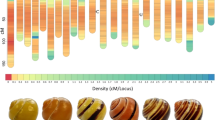Abstract
Two electrophoretic variants of the 6-phosphogluconate dehydrogenase (6PGD) enzyme have been found in the WHO/IN/Musca domestica/1 housefly laboratory strain. The patterns shown by Cellogel zone electrophoresis can be fully explained by the hypothesis of two codominant autosomal alleles. On this hypothesis, a specific Pgd locus has been postulated and the symbols Pgd A and Pgd B have been assigned to the two alleles causing the PGD-A and PGD-B phenotypes. The bands corresponding to the homozygous phenotypes PGD-A and PGD-B have different electrophoretic mobility and staining intensity; they can be described, respectively, as “fast-weak” and “slow-thick.” The heterozygous phenotype PGD-AB gives a three-banded pattern, indicative of a dimeric structure for this enzyme; this pattern is asymmetrical. Heterozygous flies have been found both among wild-type strains of recent colonization and among old established laboratory colonies. Most strains are Pgd B monomorphic; up to now only three strains have been Pgd A monomorphic, all of them being multimarker strains. The Pgd locus has been traced to the housefly linkage group III.
Similar content being viewed by others
References
Bewley, G. C., and Lucchesi, J. C. (1975). Lethal effects on low and “null” activity alleles of 6-phosphogluconate dehydrogenase in Drosophila melanogaster. Genetics 79451.
Chapman, V. M. (1975). 6-Phosphogluconate dehydrogenase (6PGD) genetics in the mouse: Linkage with metabolically related enzyme loci. Biochem. Genet. 13849.
Chefurka, W., Horie, Y., and Robinson, J. R. (1970). Contribution of the pentose cycle to glucose metabolism by insects. Comp. Biochem. Physiol. 37143.
Cheng, M. L., and Hacker, C. S. (1976) Inheritance of 6-phosphogluconate dehydrogenase variants in Culex pipiens quinquefasciatus Say. J. Hered. 67215.
Chovnick, A., Gelbart, W., McCarron, M., Osmond, B., Candido, E. P. M., and Baillie, D. L. (1976). Organization of the rosy locus in Drosophila melanogaster: Evidence for a control element adjacent to the structural element. Genetics 84233.
Cooper, D. W., Irwin, M. R., and Stone, W. H. (1969). Inherited variation in the dehydrogenases of doves (Streptopelia). I. Studies on 6-phosphogluconate dehydrogenase. Genetics 62597.
Geer, B. W., Kamiak, S. N., Kidd, K. R., Nishimura, R. A., and Yemm, S. J. (1976). Regulation of the oxidative NADP-enzyme tissue levels in Drosophila melanogaster. I. Modulation by dietary carbohydrate and lipid. J. Exp. Zool. 19515.
Gelbart, W., McCarron, M., and Chovnick, A. (1976). Extension of the limits of the XDH structural element in Drosophila melanogaster. Genetics 84211.
Gordon, H., Keraan, M. M., Woodburne, V., and Sophangisa, E. (1969). Quantitative variation of 6-phosphogluconate dehydrogenase in an African population. Nature 22196
Gvozdev, V. A., Gerasimova, T. I., Kogan, G. L., and Braslavskaya, O. Y. (1976). Role of the penthose phosphate pathway in metabolism of Drosophila melanogaster elucidated by mutations affecting glucose 6-phosphate and 6-phosphogluconate dehydrogenases. FEBS Lett. 6485.
Gvozdev, V. A., Gerasimova, T. I., Kogan, G. L., and Rosovsky, J. M. (1977). Investigations on the organization of genetic loci in Drosophila melanogaster: Lethal mutations affecting 6-phosphogluconate dehydrogenase and their suppression. Mol. Gen. Genet. 153191.
Kazazian, H. H., Jr., Young, W. J., and Childs, B. (1965). X-linked 6-phosphogluconate dehydrogenase in Drosophila: Subunit association. Science 1501601.
Lucchesi, J. C. (1973). Dosage compensation in Drosophila. Ann. Rev. Genet. 7225.
Meera Khan, P. (1971). Enzyme electrophoresis on cellulose acetate gel: Zymogram patterns in man-mouse and man-Chinese hamster somatic cell-hybrids. Arch. Biochem. biophys. 145470.
Ohno, S. (1967). Sex chromosomes and sex-linked genes. In Labhard, A., Mann, T., and Samuels, L. T. (eds.), Monographs of Endocrinology, Vol. I., Springer-Verlag, New York, pp. 93–95.
Parr, C. W. (1966). Erythrocyte phosphogluconate dehydrogenase polymorphism. Nature 210487.
Parr, C. W., and Fitch, L. I. (1967). Inherited quantitative variations of human phosphogluconate dehydrogenase. Ann. Hum. Genet. 30339.
Schwartz, D., and Endo, T. (1966). Alcohol dehydrogenase polymorphism in maize-simple and compound loci. Genetics 53709.
Shaw, C. R. (1965). Electrophoretic variation in enzymes. Science 149936.
Thuline, H. C., Morrow, A. C., Norby, D. E., and Motulsky, A. G. (1967). Autosomal phosphogluconate dehydrogenase polymorphism in the cat (Felis cattus L.). Science 157431.
Young, W. J. (1966). X-linked electrophoretic variation in 6-phosphogluconate dehydrogenase in Drosophila melanogaster. J. Hered. 5758.
Author information
Authors and Affiliations
Additional information
This investigation was partially supported by Research Grants No. 76.01256.04 and No. 77.01419.04 from the Consiglio Nazionale delle Ricerche (C.N.R.), Rome, Italy.
Rights and permissions
About this article
Cite this article
Gasperi, G., Malacrida, A. & Milani, R. 6-phosphogluconate dehydrogenase in the housefly, Musca domestica L.: Evidence for inheritable 6PGD polymorphism. Biochem Genet 17, 855–865 (1979). https://doi.org/10.1007/BF00504308
Received:
Revised:
Issue Date:
DOI: https://doi.org/10.1007/BF00504308




